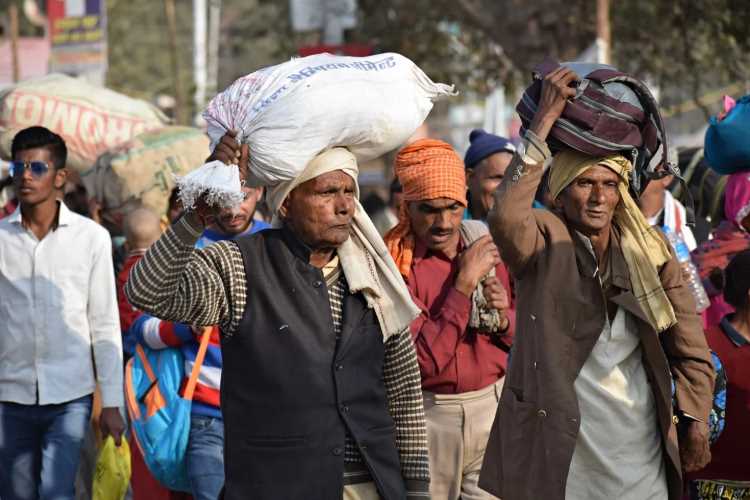By KR Antony
We are back. Holed up in sheds and living in ghettoes and slums, now we got the virus. You can hate us for that.
Indian economy: Once upon a time, we were tilling our soil and cultivating everything we needed. Seeing the lush green fields and the grains and pulses we produced, we were honoured as equal as the soldiers keeping vigil at the border by the slogan “Jai Jawan, Jai Kisan”. Then there was monsoon playing hide and seek, along with drought, crop failure, unpaid farm loan, debt trap, suicidal thoughts and seasonal migration.
It was the desiccation of the rural economy that forced us into an exile. We left the villages that were green and atmanirbhar. From life of freedom and Gram Swaraj to life of congestion and squalor. We suffered a long journey for the sake of savings from better wages for our skills and hard work. Are our outputs any less than those of the industrial workers or of expatriates to the economy?
READ I Atmanirbhar Bharat: Creating a world class capital goods industry
We were at construction sites of high-rise buildings, bridges, highways, brick kilns and security gates. We worked as drivers and rickshaw pullers, while our wives worked as domestic helps. We were dispersed into wide farmlands and plantations, learning new skills on site.
We were denied welfare rights like subsidised food rations and voting rights during elections. According to the last Census, we were 4.5 crores in strength. A third of that number is 19-29 years old. Still we had no political voice as we were considered migrants all the time.
Then came coronavirus, spreading like wild fire, affecting even prime ministers and big officers, and not the poor. Denied of wages and means of livelihood, we wanted to get back home. Sons and daughters of the officials, undergoing coaching to become future Officers, were brought home to Agra and Lucknow by luxury buses when we were not offered even a passenger train. Our government evacuated stranded pilgrims from Iran and Arabian countries by flight free of cost. But we had to wait for months to finally get the green signal for our special trains.
READ I Transparent taxation: Last mile reforms can galvanise tax collections
Are we not children of Bharat Mata? Hundreds of buses lined up to transport us across UP got cancelled to satisfy the egos of the high and mighty.
A series of lockdowns announcements by our Prime Minister followed. We failed to understand why such whistling or ringing of bells from the balconies, and lighting of candles and diyas when we were starving. Helicopters were dropping flowers instead of rice or atta packets. We wished to climb on to those helicopters to reach back our native villages.
We started walking in the scorching sun. We did not stop despite blisters due to worn-out footwear. One of us walked all the way from Vapi, coastal Gujarat, to Dibrugarh and fell exhausted at the quarantine centre. One peddled the bicycle with his pregnant wife and daughter. The police treated us like criminals and scolded those gave us food, water, night shelter and toilet facilities.
READ I Treat migrants with empathy, allow them to go home
Finally, Shramik Special trains started moving. Much delayed decision compared with the late-night decision to clamp a lockdown of 133 crore people. Forty-three trains from Bangalore alone carried 56,000 people back home while two and a half lakh are still waiting. Kerala had to cancel four trains as Bihar refused permission to receive its own people. If only there was advance information on special train schedule and the list of shelter homes for those who are on the move.
What next? First, home states need an attitudinal change. Those who return to home states are not a nuisance or burden. They are hard working, productive and have already remitted large amounts of money to the home states. They have acquired many new skills — driving, masonry, carpentry, painting, culinary, plumbing, electrical and mechanical repairing works. These skills are assets to the home states. Convert those skills into output, products and cash.
Many home governments were clueless about the number and whereabouts of their own people who have migrated. So much for their caring and compassion. They are yet to assess the newly acquired skill sets. Let us start the planning with exact numbers.
READ I NEP 2020: Knowledge economy for the globalised world
Then comes the rational deployment. How to locally employ the unskilled for MNREGA works, and skilled ones for contract works or in small and medium enterprises. The home state has to come up with a financial package to these entrepreneurs quickly to boost the economy.
To coordinate all these efforts, there is a need to set up a state commission for migrant workers that can review the Inter-state Migrant Workers Act, 1979 and suggest modifications. It can engage consultants for quick studies and data base generation, inter-departmental coordination among departments such as labour, industries, agriculture, handicrafts, cottage industries, export council, skill resource assessment, appointment and contracts. It can issue smart cards after registration, facilitate portability of MNREGA job cards, PDS cards, PMJAY and Voter ID cards. Whenever requirements from other states arise for skilled or skilled labour force, the contract and placement wing of the commission can meet this demand.
The coronavirus pandemic has made a biological accident into a manmade disaster of prejudice, discrimination and hate. At least redeploying the migrant workforce will have a soothing effect.
(Dr KR Antony is an independent public health consultant based in Kochi. He has served UNICEF, SHRC Chhattisgarh and National Health Mission. Views are personal.)

